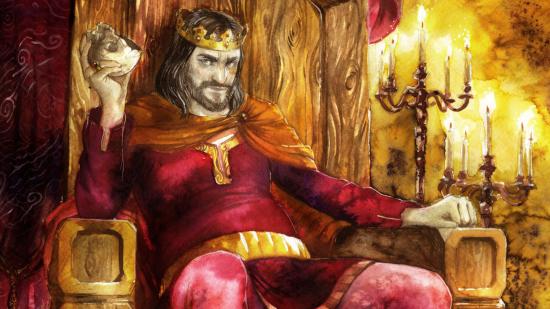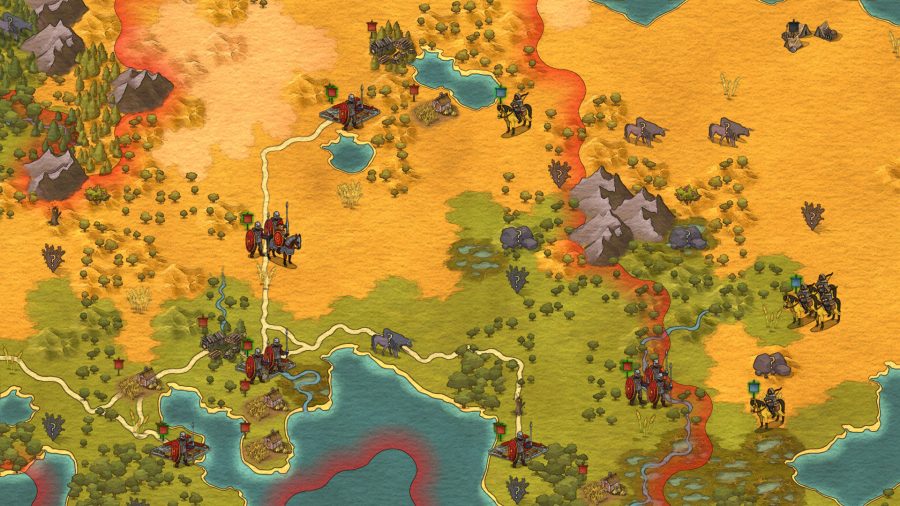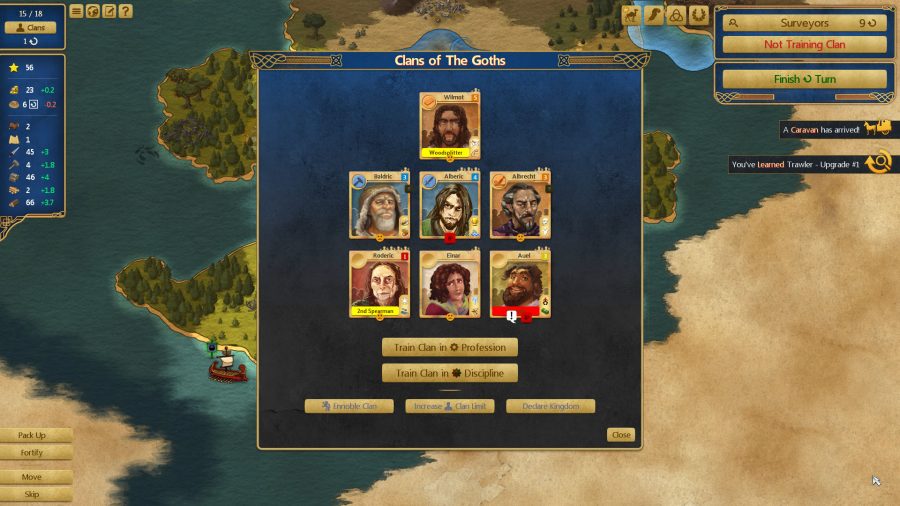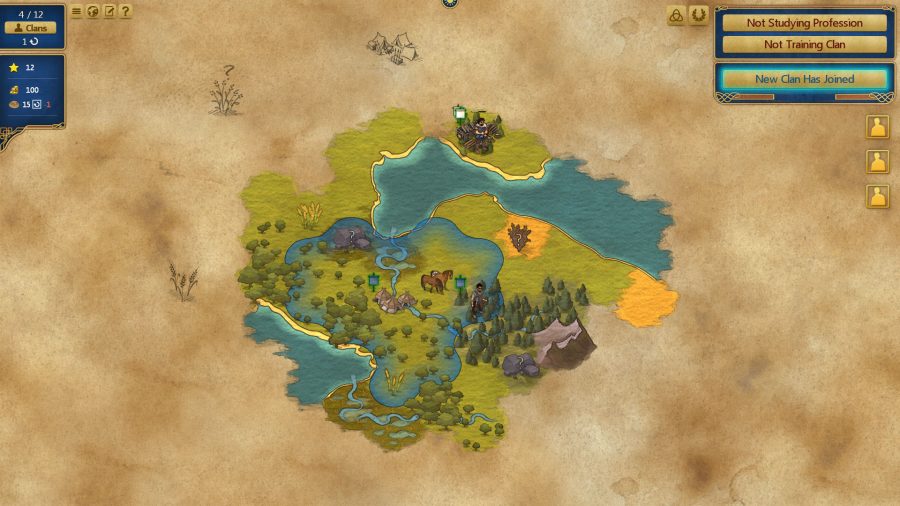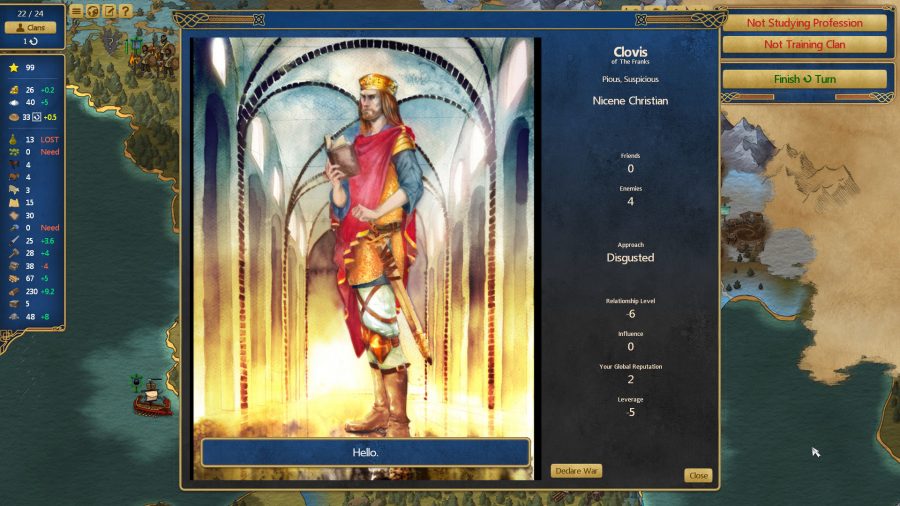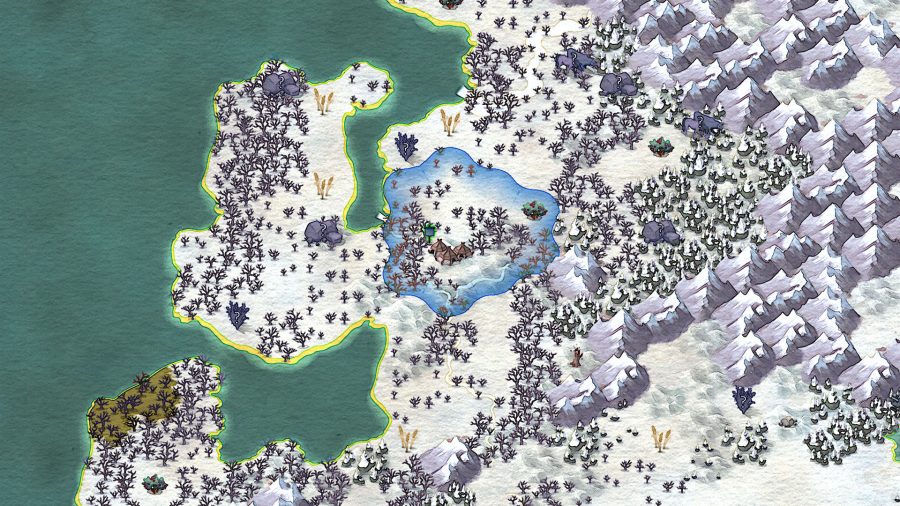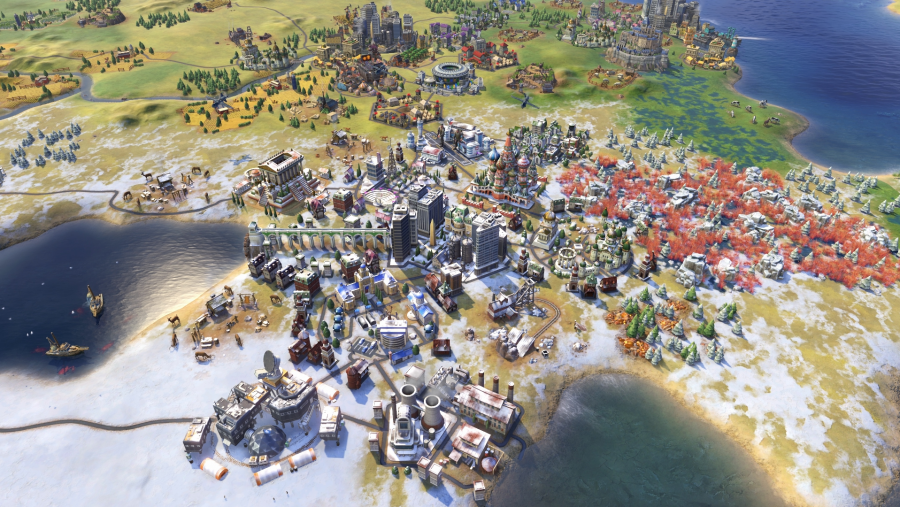If you’ve already heard of At The Gates, you’re most likely situated firmly within its target audience, ready and waiting to be crushed by the trebuchet of hardcore 4X. If not, well – there’s a good chance you’re ready for a strategy game like this. This is one for graduates of Civ, and that’s literally true for its developer, too – At The Gates creator Jon Shafer was the lead designer on Civilization V.
This is Shafer’s magnum opus – a game several years in the making, during which time he has joined and then left Paradox, burned out and, in his own words, rebuilt his life. Shafer may have finished At The Gates, but at points in the process it nearly finished him.
Sitting down with the designer, we talk about the roguelike elements in At The Gates, the influence of Crusader Kings and XCOM on bringing characters to 4X, and breaking out of the formula left by Civ.
PCGN: Could you start by giving us a quick overview of what At The Gates is all about?
Shafer: At The Gates is a turn-based strategy game in the 4X genre. It’s similar to games like Civilization, but it’s quite a bit more hardcore. It’s a tougher game, it’s a slower game, but for fans of strategy, and 4X in particular, it’s also going to be a very rewarding game. I am very confident that there’s a lot here.

It pulls in elements from other genres like roguelikes. There’s more asymmetry, so games will be different from one run to the next. You might have a huge amount of treasure from a gold deposit in one game, but in another you might start way up in the far north and have to deal with starvation a lot.
Other strategy and 4X games have always tried to make everything symmetrical. Every playable faction is balanced against each other. We don’t have multiplayer, so we don’t need to do that, and I really wanted to explore that space. It’s a place where we can do some new things within the genre.
What would you say is its headline feature, the single thing you’d want people to know about it?
Probably the clan system. The clans are like characters, and you spend a lot of the game managing them. This was inspired by games like Crusader Kings or XCOM, where you have a group of individuals with different traits. They can develop desires and get into feuds with one another, and what professions they have and what they’re suited for can depend very much on those traits. Compared to a game like Civilization, where you’re managing from a much higher level – that of cities and units – in At The Gates you are instead managing characters.
I had lots of choices to make around managing professions, stocking up for winter, relocating my camp, then getting watchmen to extend my supply territory.
It’s going to be a lot early on – too much for some players, for sure. On top of that initial learning experience you’ve got the asymmetry, the different kinds of clans that can show up, and the different resources that are available to you from game to game. Even as the designer, after seven years I still start games and I’m like, ‘Oh, hmm, I haven’t seen this. Ok. What do I do here?’.
In so many other games you end up thinking: ‘what’s the standard build or research order?’. You don’t do that in this game – you can’t. For some people it’s comforting, being able to do similar things from game to game, but that’s not what At The Gates is meant to be.
You directed Civilization V. Do these changes draw on your experience there?
Yeah, I’ve learned a lot from Civ. I wanted At The Gates to be a game that you could literally play forever – maybe not straight through, that would be pretty intense! But it’s the kind of game that you will pick up every year or two after playing it a lot early on. There’s always going to be something new there. I think it’s something that will probably stay on people’s hard drives for a long time for that reason.
Civ has a pretty prescribed formula at this point. It’s a series that’s been going since 1991, so you can’t change a ton there. I changed a few things with Civ V, but the basic formula is what it is. With At The Gates I wanted to say, ‘Ok, how can we make these decisions tougher? How can we reduce the micromanagement of just having 20 workers, or the micromanagement of having ten or 20 or 50 cities that I don’t really care that much about? How can we focus this down to very specific decisions that are difficult, but you don’t have to make that many of them?’. Each turn, you maybe have two or three [decisions], and they’re tough.
Again, that’s going to appeal to some players and not to others. But as a strategy fan myself I wanted something that did have that that depth that I could really just dig into. And I mean, I was a huge Civ fan long before I ever designed Civ V. I’ve spent thousands of hours playing it, I have spreadsheets and all sorts of things. I played in something called democracy games, where you have a group of people that run a civ as a democracy, and we had different cabinet ministers, and I was Minister of War and then I was the President.
I’ve been really deep into into this genre, and I wanted something that supported that. That’s maybe the biggest takeaway – if this is going to be a strategy, then let’s focus on the decisions themselves. It ended up being a pretty tough game, but that’s something I’m okay with.
The busywork piles up toward the endgame in Civ. How would you say your decisions evolve in At The Gates?
The busywork doesn’t increase. You end up with quite a few resources, so there’s a lot to think about there, but it builds up incrementally. If you just looked at a screenshot of the clan screen with 40 clans there, or the resources panel with 20 resources all being produced and consumed – if you just saw that without having ever played the game you would think it’s impossible. But it’s done incrementally, until you end up building very powerful kingdoms by the end of the game.
Some people have said too powerful, and that’s probably something we’ll look at post-release in balance patches. But the idea is you start off feeling very restricted. Things are hard to do, and it takes time. Then all these things come together in a really powerful way in the mid-game, and the late game where you’re just like, ‘Holy shit I got everything, yeah, this is rolling! The Romans are in trouble’.
But they’re not the only challenge early on – at least one of my neighbours was quite far ahead of me. I guess it’s possible to overtake them?
Some of them, yes, definitely. But this is where the asymmetry of the game comes in. It’s maybe a little more like a Paradox game in that sense where, instead of everybody starting with just one settlement and it’s a race to the to the victory condition, everybody starts at a different level. Some of the other tribes will start at a similar strength to you, others will start much stronger, and some stronger than you can ever be. So you have to take that into account when you’re making your decisions diplomatically.
This isn’t a game where you’re competing with the other factions for victory. The victory conditions are only for you, and the question is whether you can make it or not. But you will need to factor in the other tribes – you’re not going to be on the same level until the late game, probably.
It’s been over seven years since you started work on At The Gates. What’s been the main hiccup?
Well the big thing, honestly, was that I wanted to do too much – I tried to do too much, and I hit a wall back in 2015. I actually wrote a long article on my personal blog: ‘How At The Gates took seven years of my life and nearly the rest’. So you can check that out, but the basic answer is I gave the game everything I had, and then I didn’t have anything left and it nearly destroyed me. So I couldn’t work on a game for a while. It took a long time to kind of rebuild myself and my life, honestly, before I was in a position where I could work on anything again.
How does it feel to be finally shipping it?
It’s a little bit surreal because I started it about a quarter of my life ago. There’s so much going on right now that I’m just kind of in ship-it mode, where I’m not really focusing on much other than the next thing on my list, so there’s honestly not a lot of time to look back and think about things in a deep way. I’m sure it’s going to feel a lot weirder in a couple of weeks.
You’ve said At The Gates was part-conceived by a conversation with a friend who had an idea about managing Rome’s decline, but clearly you had other inspiration. How did all your ideas coalesce?
Yeah, that was that was one of the factors. Another one was having listened to a lot of Mike Duncan’s History of Rome podcast, back in 2011 and 2012. I was in a place in my life where I wanted to start working on a new game, or at least prototyping something. I knew I wanted to do something where decisions mattered more, and to incorporate elements from other strategy games that I thought were interesting.
For example, the centralised tribe having one single city was a mechanic inspired by an old SSI Game named Imperialism, where you have a capital city and it takes place during the 19th century. You’re building railroads, harvesting resources, and conducting diplomacy and war, but one of the big innovations was that there was just one screen, basically, where you managed your economy.
Related: Explore the best 4X games on PC
This appealed to me in a strong way, because it was much cleaner than having 15 or 30 cities to manage. Everybody knows when you play a game of Civ that most of the cities don’t matter. You don’t care. You care about those first few ones, sure, but there’s diminishing returns to the point where founding a new city is not fun at all. It’s removing fun from the game, and it shouldn’t be that way.
I also wanted to do something interesting with the map, to have it change in some way, because I’ve always loved maps. I spent a lot of time on the map generation in Civ and in At The Gates – there’s a climate generation system, we’re modeling rainfall and temperature, and you can see this play out as the seasons pass. There’s a very detailed simulation that models all these things, and it’s ultimately in service of the gameplay because the seasons changing is an important element in At The Gates. It’s one of the things that helps it stand out from other games like Civ.
What are you hoping to achieve with At The Gates? Is it just exorcising an idea or a personal urge, or did you set out to shake up 4X a little bit?
I wanted to do both. I think there are a lot of innovative elements that it can bring to the genre. It originally started as just something I thought was fun – I mean, I didn’t even expect to ship it. It was just a fun prototype to work on and then it ended up growing and growing, and and then I did a Kickstarter, and then it’s a full game. Not that easy, of course.
4X and strategic games more generally, especially if you count card games, have seen a bit of a boom in the last ten years or so. Do you have any personal, recent favourites?
I really like what Amplitude has done with Endless Legend. It’s not a perfect game, but they do a lot of new interesting things. I think fantasy was a space that was really ripe for doing a big new 4X game, and they were in the right place at the right time. They also did a really good job by having these unique factions. The art style works – they just make solid games.
I’ve never been a huge fan of space strategy games, because as a maps guy I miss the terrain. I’m like, “Uhh, it’s so empty!” You can throw in nebulas and stuff, but it just doesn’t do it for me. So space games I’ve never been a huge fan of, but Endless Legend is probably the example I’ve been most excited about in recent years.
What do you make of Civ VI?
I really like how they unstacked the cities, I think that was a cool thing. It’s a little weird with the scale, but so was the unit unstacking that I did with Civ V. So maybe it’s just natural progression there, into more of a board game-like space. I was a little surprised that they didn’t change more, and I think some fans of the genre were as well. But it’s another solid entry in the series. I’ve kind of moved on from Civ at this point, but I’m definitely excited to see what they’re going to work on going forward. I’m really curious to see what they do with seven – whether they stick with the same formula, or if they decide to mix it up again.
So At The Gates is out now – what’s next? You mentioned post-launch support, and is there another project?
I’m definitely going to be sticking with At The Gates support full-time, at least through the summer. The idea is to figure out where the balance issues are and improve the interface. There are a few things I still want to add, like a clan management screen so you can keep track of where everybody is if they’re not in your settlement. It’s something people have asked for and I agree, it makes sense. I also want to work on diplomacy a little bit more. These are things that should be taken care of in the first six months or so. After that, I may continue adding stuff, I may not – I haven’t decided yet.
After that, I’m going to start prototyping something new. I’m excited to talk about that at some point, but hopefully not six years before I release it.
Read more: Roll the dice on the best strategy games on PC
Are you going to go back to Kickstarter for that, approach a publisher, or is it too soon to say?
I think I’m going to do the prototyping mostly on my own until I have a clear idea of what I want the game to be. At that point, I’m probably going to start building a proper team. These games are incredibly difficult to make – I put too much to myself in At The Gates and one reason for that is it’s just really hard to make these games. Once I have a clear idea and a concept fleshed out for the next game, I think I’m gonna probably get some money together, hire some people, and make it a bigger thing.
